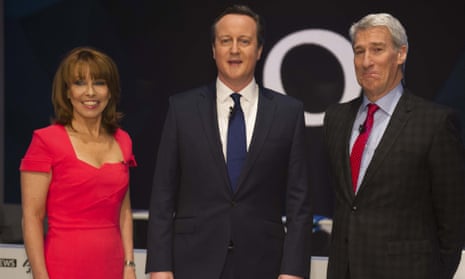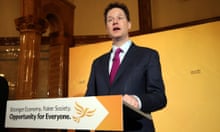According to an instant Guardian/ICM poll, David Cameron won Thursday’s leaders’ interviews, with 54% of respondents ranking him more favourably than Ed Miliband. It was a view broadly shared by a panel of undecided voters in five marginal constituencies, brought together by the Guardian and BritainThinks. The panellists’ top line was that Cameron’s performance was more assured and confident than Ed Miliband’s.
Cameron’s victory matters for two reasons.
First, possibly stating the obvious, a win is a win. Although they were possibly the most boring side to ever lift the trophy, Roberto Di Matteo’s Chelsea Champions League victory will remain in the history books.
Second, and more importantly, for all those who didn’t watch the debates – the majority of the British electorate – the headline this morning is “Cameron wins”, and the perception those voters will have of a debate they didn’t watch is just as salient as the opinion of those who viewed it.
Britain did not, however, wake up imbued with a haze of Cameron-mania, à la Clegg five years ago. For Ed Miliband, Thursday’s proceedings were far from the mauling Bill Clinton gave George HW Bush in the vintage 1992 presidential debates.
Cameron may have won, but he did so narrowly, and this is where considering pre-debate expectations is important. On this battleground, the numbers in the ICM poll bear positive news for Miliband.
Although participants are asked to put aside their personal party preference, when looking at polling around debates it is difficult to exclude pre-existing bias from the findings.
In other words, most Conservative voters think Cameron won, most Labour voters think Miliband won. The question is: what did everyone else think?
One way of looking at confirmation bias in motion is to scroll through the views of commentators on Twitter and elsewhere – most believe their man clinched the debate. Hell yes!
One way of dealing with this challenge is to compare responses in the debate poll to previous answers to similar questions.
On several of these in the ICM figures, pre-existing perceptions appear to be reinforced.
More than one in two said Miliband would govern in the interests of the many and not the few, compared with less than one in three believing the same of Cameron. And Miliband leads Cameron by 48% to 25% when it comes to who is seen as more understanding of “people like me”.
The figures flip around in Cameron’s favour when respondents were asked who was more decisive and would be more respected in the world between the two leaders.
All within the range of how the British public usually views the two leaders.
When asked, however, who they thought would make the better prime minister after Thursday’s events, 48% said Cameron, 40% Miliband. Usually on this type of question, Cameron enjoys a much more significant 15-20 point lead.
The PM was judged more convincing by 48% to 43%; to have the more appealing personality by 46% to 42%; and by a similar margin to have the best arguments.
Again, on these traits, Cameron’s lead over Miliband tends to be larger.
This too was in evidence in the responses of the Guardian/BritainThinks panellists - several, although ultimately favouring Cameron, thought Miliband outperformed his expectations.
This implies the Labour leader may have gained over Cameron in head-to-head personal ratings, and this could be significant because it is the one measure that has consistently seen him lag behind the Tory leader (and haunted how most portray and profile him).
The next few weeks of polling on these numbers should make interesting reading.
Looking at how the supporters of different parties viewed the debate, people who say they will vote Lib Dem broke for Miliband 52% to 48%, while those who voted Lib Dem in 2010 chose Miliband by 60% to 40%.
Ukip supporters ignored the party line and went for Cameron 70% to 30%.
But the most important question is whether Thursday’s Q&A will ultimately make a difference to voting intention.
There was no immediately noticeable “I agree with Nick” moment – and even if there had been, the experience of 2010 shows that, although the polls fluctuated considerably after the first debate five years ago, the final election result wasn’t too dissimilar from pre-debate polling.
There is similar evidence from the US, which has a longer tradition of election debates. A FiveThirtyEight analysis of presidential debates since 1984 found that although there is a positive relationship between perceived debate winners and head-to-head polls, this link isn’t statistically significant.
It takes time to gauge the full impact of an event on voting intention. At first, there is an immediate emotional reaction. After that, however, voters have time to think through an event, absorb the coverage and to talk to friends, family and colleagues.
This is why, for example, it is unlikely that the 8% in Thursday’s ICM poll who claim to have changed their mind on the basis of the interviews will actually do so.
In most cases, a move back to a position closer to the one a voter originally held to begin with is more common than a radical change of heart.
In an election so close, however, even small movements could influence the final outcome.
Based on the past, Thursday’s Q&A is unlikely to noticeably shift voting intention once opinion stabilises. There are at least three debates (or sort-of debates) to go, but for now don’t hold your breath.









Comments (…)
Sign in or create your Guardian account to join the discussion